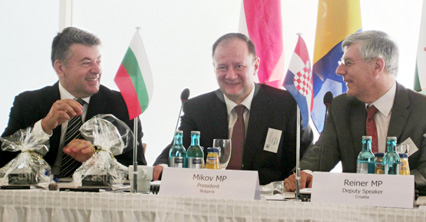
In the current economic and social situation in Europe it is particularly important to implement big scale projects in order to increase the well-being of the Danube river region. The realization of such projects is one of the four pillars of the EU Strategy for development of the countries along the Danube River. These are words from the speech of the National Assembly President, Mihail Mikov, delivered at the First Conference of parliamentary members from the Danube river countries. The forum has taken place on July 12th 2013 in the town of Ulm, Baden-Wurttemberg Province, Germany.
Mihail Mikov pointed out it is extremely important to extend support to the small and medium enterprises, which are in real danger by the continuing stagnation of the European economies. The speaker of the National Assembly has stated the cooperation between enterprises of the highly developed European regions such as the ones of Federal Republic of Germany and those of the less developed regions of North Bulgaria should be encouraged.
Mihail Mikov noted this first conference of parliamentary members of the Danube river countries comes at the exact time and is a very important initiative held at the estuary of the river Danube – the river with the highest international importance in the world. In his view, parliamentary members in the region should commit themselves to the task to tap the region’s potential for the benefit of their countries’ citizens and the trans-European security and cooperation.
The Strategy of the European Union for the Danube river region is a very appropriate basis for action in this direction. We have to determine the particular forms and steps for the most effective implementation of the Strategy in the next seven- year financial time period, he noticed. The national and regional parliaments could altogether contribute a great deal by holding detailed discussions on their Partnership Agreements with the European Commission regarding their access to the European structures and investment funds for the forthcoming period, added Mr Mihov. He confirmed that the National Assembly of Bulgaria is firmly committed to present a project for the successful realization of the advantages offered by the EC Strategy for the Danube River Region.
He noted Bulgaria aims at contributing in practical terms to one of the leading fields of cooperation – the development of internal water, rail, auto and air transport roads. Bulgaria has signed Memorandum for Understanding with Romania for common projects in the navigation of the joint part of the river.
The participants in the conference were addressed by the Speaker of the Parliament of Baden – Wurttemberg Province, Guido Wolf. He welcomed the participants stressing the MPs of the countries of the Danube river Region are the ones in the best position, together with their governments to implement the desires of the citizens living there.
The Minister of Baden – Wurttemberg for the Bundesrat, Europe and International Affairs, Peter Fridriech, described the aims and gave account of the results reached so far by the EU Strategy for the Danube Region.
The Strategy for the Danube River Region was approved by the European Council on 24 June 2011. An Action Plan was set up on the base of the Strategy. It outlines 4 pillars and 11 priority fields of development namely:
- establishing specific connections for the region ( improvement of mobility, encourage greater use of renewable energy resources and promotion of tourist activities)
- protection of the environment in the Danube river (restoration of the quality of waters, management of the risks for the environment and biodiversity protection)
- attaining of well-being in the Region of the Danube river( by developing scientific research capacity, education and information technologies, helping the competition capacity of enterprises and investing in human capital)
- strengthening of the Region of the Danube river ( by increasing the institutional capacity and improving the cooperation in the fight against organized crime)
Bulgaria was selected as co- coordinator, together with Romania, for priority area 3 named: “Promotion of activities in the field of culture and tourism” and for coordinator, together with Germany, for priority field 11: “Cooperation to counter problems in the security and organized crime field”
The Danube macro region includes 14 states, 9 of them EU members.

- 22/04/2021
The Parliament imposed a moratorium on concessions, real estate deals and appointments pending the election of a new cabinet or caretaker government - 16/04/2021
By 156 votes “in favour”, the National Assembly accepted the resignation of the Council of Ministers with Prime Minister Boyko Borisov - 15/04/2021
Speech by Mrs. Iva Miteva upon her election as a President of the 45th National Assembly - 15/04/2021
The Member of Parliament Iva Miteva was elected President of the 45th National Assembly - 15/04/2021
The Members of the 45th National Assembly were officially sworn in - 03/03/2021
The President of the National Assembly Tsveta Karayancheva and MPs attended the solemn fireworks-retreat on the occasion of the Liberation of Bulgaria - 03/03/2021
Every Bulgarian should preserve and honour the memory of those glorious ancestors, thanks to whom Bulgaria exists today, said the President of the National Assembly Tsveta Karayancheva in Gabrovo - 03/03/2021
Today we are on Shipka to pay our respects to all the heroes who sacrificed their lives for freedom, said the President of the National Assembly Tsveta Karayancheva after climbing Shipka Peak together with young people from all over the country - 02/03/2021
The Vice-President of the National Assembly Valeri Simeonov received an award from the Bulgarian Republican Self-Government in Hungary - 26/02/2021
The Parliament adopted at second reading amendments to the Measures Against Money Laundering Act
 Български
Български English
English